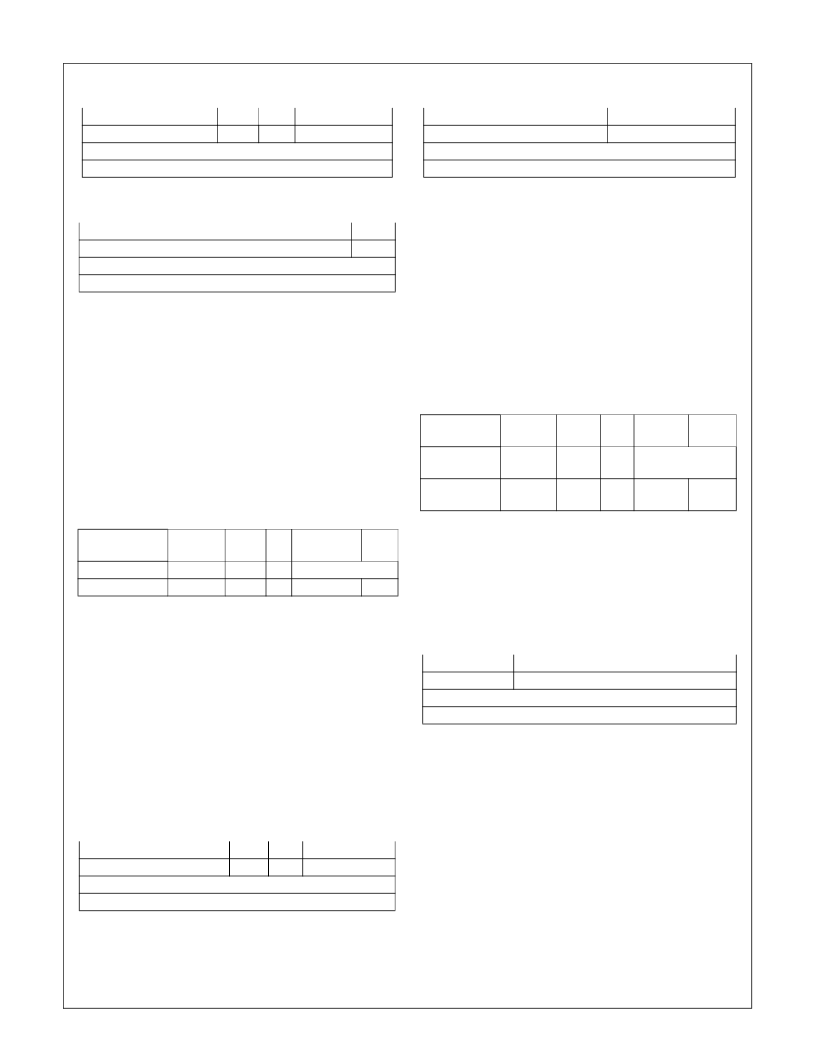- 您現(xiàn)在的位置:買賣IC網(wǎng) > PDF目錄366891 > CR16HCS5VJE8 Microcontroller PDF資料下載
參數(shù)資料
| 型號: | CR16HCS5VJE8 |
| 英文描述: | Microcontroller |
| 中文描述: | 微控制器 |
| 文件頁數(shù): | 112/157頁 |
| 文件大小: | 1256K |
| 代理商: | CR16HCS5VJE8 |
第1頁第2頁第3頁第4頁第5頁第6頁第7頁第8頁第9頁第10頁第11頁第12頁第13頁第14頁第15頁第16頁第17頁第18頁第19頁第20頁第21頁第22頁第23頁第24頁第25頁第26頁第27頁第28頁第29頁第30頁第31頁第32頁第33頁第34頁第35頁第36頁第37頁第38頁第39頁第40頁第41頁第42頁第43頁第44頁第45頁第46頁第47頁第48頁第49頁第50頁第51頁第52頁第53頁第54頁第55頁第56頁第57頁第58頁第59頁第60頁第61頁第62頁第63頁第64頁第65頁第66頁第67頁第68頁第69頁第70頁第71頁第72頁第73頁第74頁第75頁第76頁第77頁第78頁第79頁第80頁第81頁第82頁第83頁第84頁第85頁第86頁第87頁第88頁第89頁第90頁第91頁第92頁第93頁第94頁第95頁第96頁第97頁第98頁第99頁第100頁第101頁第102頁第103頁第104頁第105頁第106頁第107頁第108頁第109頁第110頁第111頁當(dāng)前第112頁第113頁第114頁第115頁第116頁第117頁第118頁第119頁第120頁第121頁第122頁第123頁第124頁第125頁第126頁第127頁第128頁第129頁第130頁第131頁第132頁第133頁第134頁第135頁第136頁第137頁第138頁第139頁第140頁第141頁第142頁第143頁第144頁第145頁第146頁第147頁第148頁第149頁第150頁第151頁第152頁第153頁第154頁第155頁第156頁第157頁

www.national.com
112
GM[28:15]
The following are the bits for the GMSKB regis-
ter.
5
4
GM[28:18]
RTR
0
r/w
GM[14:0]
The following are the bits for the GMSKX regis-
ter.
For all GMSKB and GMSKX register bits, the following ap-
plies:
— “0” is the incoming identifier bit must match the corre-
sponding bit in the message buffer identifier register.
— “1” accept “1” or “0” (“don’t care”) of the incoming ID bit
independent from the corresponding bit in the mes-
sage buffer ID registers. The corresponding ID bit in
the message buffer will be overwritten by the incoming
identifier bits.
When an extended frame is received from the CAN bus, all
Global Mask bits GM28 through GM0, IDE, RTR and XRTR
are used to mask the incoming message.
During the reception of standard frames only the Global
Mask bits GM28 to GM18, RTR and IDE are utilized.
Global Mask
GM[28:1
8]
standard frame
ID[10:0]
RTR
extended frame ID[28:18]
SRR IDE
20.9.11 Basic Mask Registers (BMSK — BMSKB and
BMSKX)
The two registers BMSKB and BMSKX allow to mask the
buffer 14, or “don’t care” the incoming extended/standard
identifier bits, RTR/XRTR and IDE. Throughout this docu-
ment, the two 16-bit registers BMSKB and BMSKX are refer-
enced to as a 32-bit register BMSK.
BM[28:15]
The following are the bits for the BMSKB regis-
ter.
BM[14:0]
The following are the bits for the BMSKX regis-
ter.
1
BM[14:0]
0
r/w
For all BMSKB and BMSKX register bits the following ap-
plies:
— “0” incoming identifier bit must match the correspond-
ing bit in the message buffer identifier register.
— “1” accept “1” or “0” (“don’t care”) of the incoming ID bit
independent from the corresponding bit in the mes-
sage buffer ID registers. The corresponding ID bit in
the message buffer will be overwritten by the incoming
identifier bits.
When an extended frame is received from the CAN bus all
Basic Mask bits BM28 through BM0, IDE, RTR and XRTR
are used to mask the incoming message.
During the reception of standard frames only the Basic Mask
bits BM28 to BM18, RTR and IDE are utilized.
Basic Mask
BM[28:1
8]
standard
frame
extended
frame
20.9.12 CAN Interrupt Enable Register (CIEN)
The CAN Interrupt Enable (CIEN) register enables the trans-
mit/receive interrupts of the message buffers 0 through 14 as
well as the CAN Error Interrupt.
15
14
EIEN
0
r/w
EIEN
Error Interrupt Enable. This bit allows the
CR16CAN to interrupt the CPU if any kind of
CAN receive/transmit errors are detected. This
means any error status change in the error
counter registers REC/TEC is able to generate
an error interrupt if EIEN is enabled.
“0”
The error interrupt is disabled and no error
interrupt will be generated.
“1”
The error interrupt is enabled and a
change in REC/TEC will cause an inter-
rupt to be generated.
Buffer Interrupt Enable. The IEN[14:0] allow
the user to enable/disable interrupt source for
each of the message buffers i.e., IEN14 config-
ures buffer14 and IEN0 configures buffer0.
“0”
buffer as interrupt source disabled
“1”
buffer as interrupt source enabled
IEN[14:0]
15
3
2
0
IDE
GM[17:15]
15
1
0
GM[14:0]
XRTR
0
r/w
RTR
a
a.
the RTR bit has a different position in standard and
extended frames
— for standard frames the GMSK_RTR bit is used to
mask this bit
— for extended frames the GMSK_XRTR bit is used to
mask this
bit
IDE
GM[17:0]
XRT
R
IDE
unused
ID[17:0]
RTR
15
5
4
3
2
0
BM[28:18]
RTR
0
r/w
IDE
BM[17:15]
15
0
XRTR
RTR
a
a. the RTR bit has a different position in standard and
extended frames
— for standard frames the BMSK_RTR bit is used to
mask this bit
— for extended frames the BMSK_XRTR bit is used to
mask this bit
IDE BM[17:0]
XRTR
ID[10:0]
RTR
IDE
unused
ID[28:18]
SRR
IDE
ID[17:0]
RTR
0
IEN[14:0]
相關(guān)PDF資料 |
PDF描述 |
|---|---|
| CR16HCS9VJE7Y | Microcontroller |
| CR16HCS9VJE8Y | Microcontroller |
| CR16HCT5 | |
| CR16HCT5VJE7Y | Microcontroller |
| CR16HCT5VJE8Y | Microcontroller |
相關(guān)代理商/技術(shù)參數(shù) |
參數(shù)描述 |
|---|---|
| CR16HCS5VJE8Y | 制造商:未知廠家 制造商全稱:未知廠家 功能描述:Microcontroller |
| CR16HCS5VJI8 | 制造商:NSC 制造商全稱:National Semiconductor 功能描述:Family of 16-bit CAN-enabled CompactRISC Microcontrollers |
| CR16HCS9 | 制造商:NSC 制造商全稱:National Semiconductor 功能描述:Family of 16-bit CAN-enabled CompactRISC Microcontrollers |
| CR16HCS9VJE0 | 制造商:NSC 制造商全稱:National Semiconductor 功能描述:Family of 16-bit CAN-enabled CompactRISC Microcontrollers |
| CR16HCS9VJE1 | 制造商:NSC 制造商全稱:National Semiconductor 功能描述:Family of 16-bit CAN-enabled CompactRISC Microcontrollers |
發(fā)布緊急采購,3分鐘左右您將得到回復(fù)。